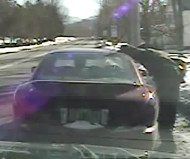Article from: www.thenewspaper.com/news/66/6624.asp
1/8/2019
Vermont Supreme Court Holds Cops Liable For Racist Traffic Stop
Black motorist may sue Vermont State Police over a baseless traffic stop.
 The Vermont State Police may soon be forced to compensate motorists pulled over for driving while black. The state Supreme Court was unanimous last week in holding the state agency liable for such conduct in a ruling that reviewed the conduct of then-Trooper Lewis Hatch toward 21-year-old black motorist Gregory W. Zullo.
The Vermont State Police may soon be forced to compensate motorists pulled over for driving while black. The state Supreme Court was unanimous last week in holding the state agency liable for such conduct in a ruling that reviewed the conduct of then-Trooper Lewis Hatch toward 21-year-old black motorist Gregory W. Zullo.
Zullo was behind the wheel of his mother's 2005 Pontiac Sunfire on March 6, 2014, and was headed to a friend's house in Wallingford. The best excuse the trooper could come up with for initiating the traffic stop was that there was a tiny amount of snow blocking the Pontiac's rear license plate registration sticker. Dashcam video showed the rest of the plate could easily be read. After approaching Zullo, the trooper claimed he smelled marijuana, so he asked if he could search the car.
When Zullo refused, Trooper Hatch had the car impounded and searched. Nothing illegal was found. Zullo had to walk eight miles home in 23 degree weather because the officer refused to let the motorist retrieve his wallet and phone from the car to arrange a ride. Later that evening, Zullo was forced to pay a $150 fee to get his car back, even though he was not charged with a crime.
Zullo sued the state police, but officials insisted they could not be held liable. The high court justices concluded that the state could not assert sovereign immunity after violating Zullo's rights.
"Invoking absolute sovereign immunity to prevent a remedy for significant breaches of constitutional rights would undermine the fundamental protections provided by our state constitution, which exists to dictate certain boundaries to the government," Justice Helen M. Toor wrote for the court.
Ordinarily, an illegal search cases would have been resolved by applying the exclusionary rule. That was not possible here because Zullo committed no crime, and there is no evidence to exclude. The judges rejected the state's suggestion that Zullo could just file an administrative complaint against the trooper.
"Even if a confidential internal affairs investigation resulted in some disciplinary action against a law enforcement officer," Justice Toor wrote, "it would offer no remedy to individuals deprived of their constitutional rights, other than the knowledge that the offending officer may or may not have been disciplined, which may or may not result in others being spared a similar deprivation of their rights."
The court sent the case back to the trial court to develop the facts. If further proceedings show the trooper's actions were malicious or that he should have known that he had no basis in the law for stopping Zullo, the state police would have to pay Zullo punitive damages.
"In ruling that police can be liable for such acts, this decision sends a clear message -- no one is above the law, and if police make bad stops, they can and will be held accountable," said American Civil Liberties Union attorney Lia Ernst, who represented Zullo.
A copy of the ruling is available in a 350k PDF file at the source link below.
Source: Zullo v. Vermont (Vermont Supreme Court, 1/3/2019)
Permanent Link for this item
Return to Front Page
 The Vermont State Police may soon be forced to compensate motorists pulled over for driving while black. The state Supreme Court was unanimous last week in holding the state agency liable for such conduct in a ruling that reviewed the conduct of then-Trooper Lewis Hatch toward 21-year-old black motorist Gregory W. Zullo.
The Vermont State Police may soon be forced to compensate motorists pulled over for driving while black. The state Supreme Court was unanimous last week in holding the state agency liable for such conduct in a ruling that reviewed the conduct of then-Trooper Lewis Hatch toward 21-year-old black motorist Gregory W. Zullo.